Comprehensive Reviews of Pet Bird Food for Avian Care
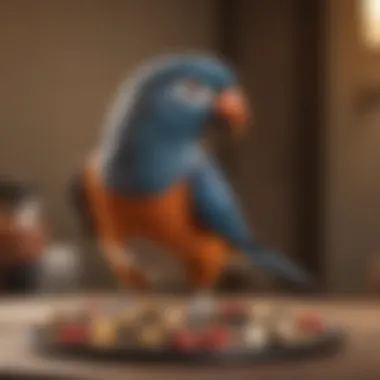
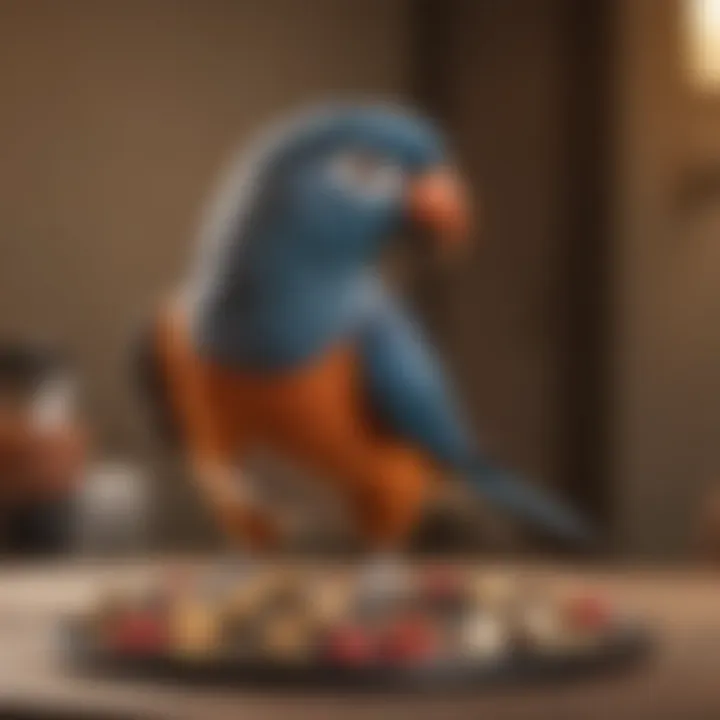
Intro
Choosing a proper diet for pet birds is essential for their health and happiness. Unlike traditional pets like dogs and cats, birds have specific dietary needs that directly impact their well-being. Understanding these needs can help owners promote a longer and healthier life for their avian companions. This guide aims to present a thorough analysis of pet bird food options, allowing bird owners, whether seasoned enthusiasts or newcomers, to navigate the complex world of avian nutrition with confidence.
Proper nutrition provides not only the required energy but also supports avian growth, feather quality, and overall vitality. Any fluctuations in dietary components can lead to health issues. Therefore, it’s prudent to explore various food types and examine their respective advantages and drawbacks. From pellets, seeds, to fresh foods, every option carries its own set of nutritional values and concerns. By the end of this article, readers will winknow how a thinkinhapproach can guide their decisions around feeding their feathered friends the best possible diet.
We'll also incorporate expert opinions and glean insights from periodic surveys of bird owners to provide a well-rounded view of optimal dietary trends.
Care Tips
Caring for pet birds encompasses several essential routines that impact their well-being. Establishing proper care can foster a cohesive relationship between the owner and the bird, elevating the entire pet ownership experience. It is crucial to maintain an environment that stimulates both physical and mental health for these creatures. Here are some practices to incorporate into your daily life as a bird owner:
Daily Care Routines
Birds thrive on structure and familiarity. It helps to adhere to a consistent feeding schedule. Offer fresh food and water daily to ensure hydration and nourishment. Removing leftovers from the previous day helps prevent bacterial growth. Additionally, observe any behavioral changes, signaling possible health concerns.
Cage Setup and Maintenance
Proper cage setup directly influences a bird’s contentment and health. Spacious enclosures provide room for movement. Perches should vary in width and texture to promote foot health. Regular cleaning is essential. Waste can be harsh on a bird's lungs, so aim for cleanliness and hygiene.
Hygiene and Cleaning Practices
Cleaning the cage should be routine. Use mild, bird-safe cleaning products to minimize any potential harm. Disinfect perches, toys, and food dishes weekly to ensure hygiene and keep pathogens at bay.
Seasonal Care Adjustments
Changing seasons can affect your bird's behavior and needs. In warmer months, ensure plenty of hydration. In cooler months, provide additional warmth and comfort. Make accommodations according to behavioral changes.
Prologue to Pet Bird Nutrition
Pet bird nutrition is a pivotal aspect of avian care that directly affects the health and well-being of these animals. It's essential because a diet lacking in necessary nutrients can lead to various health problems, some of which might be challenging to correct. Bird owners should prioritize understanding their pets' dietary needs to enhance their quality of life. Fostering proper nutrition can help increase longevity, support feather coloration, and encourage active behaviors.
Importance of a Balanced Diet
A balanced diet consists of various food components that work together to maintain optimal health. Pet birds need a combination of carbohydrates, proteins, fats, vitamins, and minerals. Limitations in any nutrient may cause deficiencies with significant consequences.
It is improper to feed a pet bird only seeds. Seeds typically lack sufficient nutrients and should be supplemented with fresh produce and commercial pellets designed for birds. For example, fruits and vegetables provide essential vitamins and minerals, while pellets often convert common ingredients into a cohesive formula that meets general nutritional guidelines. Maintaining a balanced diet also ensures proper digestion and helps in preventing obesity.
Furthermore, unique dietary requirements exist for different bird species, making it vital for owners to research their specific needs before determining suitable food. Avian nutrition is fluid, needing adaptation and attention over time.
Common Myths About Bird Feeding
Misunderstandings about bird nutrition can lead to inappropriate feeding practices, potentially harming avian pets. One common myth is that seeds can constitute a complete diet. In reality, seeds often lack vital nutrients. Some pet owners also assume that birds should eat similar food types as their human companions; this is false as many foods are unsafe or unsuitable for birds.
Other myths involve time consumption for dietary preparation. In fact, preparing a nutritious meal for birds is simpler than most think. Utilizing high-quality commercial pellets and supplementing with fresh foods can be efficient and beneficial.
Additionally, there’s a belief that all fruits and vegetables are safe. This is misleading because some foods, like avocado, are toxic to birds. Owners should research specific food types before introducing them to a pet bird's diet.
Overall, embracing factual information about avian nutrition leads to better care and dietary choices. Understanding these necessary aspects of pet bird feeding lays the groundwork for further discussion on food types, ingredients, and best practices for avian feeding.
Types of Bird Food
Understanding the variety of bird food available is crucial for any owner seeking to provide optimal nutrition for their pets. The different types of food hold unique benefits and potential downsides. Having a grasp on what each type provides allows bird enthusiasts to implement a balanced approach to their birds' diets. Furthermore, this knowledge assists in catering to birds' specific preferences and health needs. With insights into the components of seeds, pellets, fresh foods, and treats, owners can make pivotal choices to promote their birds’ wellbeing.
Seeds: Pros and Cons
Seeds are often the most recognized form of bird food, and they come in countless varieties. Many birds naturally gravitate toward seeds due to their taste and texture. However, they alone frequently do not offer a balanced diet.
Pros:
- Palatable: Most birds love seeds, making it easy to introduce them into their diet.
- Variety: Numerous seed blends are available, catering to different species' preferences.
- Nutrient dense: Rich in fats, seeds can provide immediate energy.
Cons:

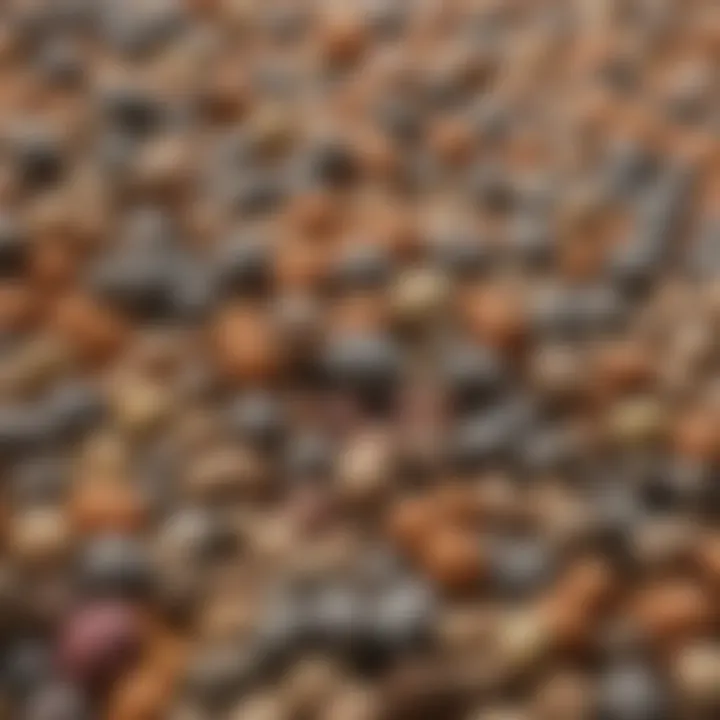
- Limited Nutrition: Many seeds lack comprehensive nutrients necessary for long-term health.
- High-fat content: Excessive seed intake can lead to obesity.
- Imbalanced diet: Relying solely on seeds can cause nutritional deficiencies.
The takeaway regarding seeds involves moderation. Seeds can serve as an enjoyable addition but should not serve as the primary food source.
Pellets: A Nutritionally Complete Option
Pellets stand out as the preferred diet among avian veterinarians and pet nutritionists. They provide a balanced approach to nutrition by combining vital ingredients in secure formulations.
Key Benefits:
- Nutrifically Balanced: Pellets contain an optimal mix of vitamins, minerals, and other nutrients for overall health.
- Consistent Composition: Unlike seeds, pellets offer a stable nutrient profile.
- Convenience: Easier to measure, ensuring regular feeding amounts are maintained.
However, transitioning solely to pelleted diet may see resistance at first for seed-loving birds. Kliding them gradually into this food is an effective method that many bird owners report success with.
Fresh Foods: An Essential Component
Incorporating fresh foods into a pet bird's diet provides valuable nutrients and stimulation. It becomes an essential element in a balanced diet, contributing both hydration and vital micronutrients.
Suitable fresh foods include:
- Leafy greens like kale or spinach.
- Vegetables such as carrots, broccoli, and bell peppers.
- Fruits such as apples, berries, and bananas.
Birds benefit from exposure to a variety of textures and colors, encouraging exploration.
Key Points:
- Hydration: Fresh foods often contain high water content, helping keep birds hydrated.
- Nutrient-Rich: Offers the vitamins and minerals typically missing in processed bird foods.
- Enhances Entertainment: Provides mental and physical stimulation.
Present disagreements about widely varying acceptance among individual species may exist. Bird owners should take note on how their own birds respond to introducing fresh foods and consider patience as an imperative virtue.
Treats: Safe Indulgences
Treats add a layer of enjoyment to a bird's dietary experience. When utilized responsibly, they can support good behavior or enrich bonding moments without replacing the main diet.
Common bird treats:
- Occasional seeds or nuts, like sunflower seeds in moderation.
- Dehydrated fruit formations often make appealing snacks.
- Commercially prepared bird treats, which can deliver specialized benefits.
However, moderation remains a dominant factor. Treats should complement a balanced diet rather than replace healthy large meals.
Ultimately, the various methods of feeding present layers of complexity for bird owners. Being informed allows enthusiastic caregivers to tailor sonvesh keen nutrition informed decisions, crucial for the long-term health of their feathery companions.
Evaluating Bird Food Labels
Evaluating bird food labels is crucial for pet bird owners to ensure their avian companions receive a balanced diet. Many products on the market make tempting promises, but not all are beneficial for birds. Understanding how to read and discern the content in these labels can guide owners to make informed choices. This helps in preventing health issues related to poor nutrition, supporting thriving and energetic pets.
Ingredient Lists: What to Look For
When you review the ingredient lists on bird food packages, consider the first three to five items. They indicate the primary components. Ingredients should ideally be described using specific terms like switchgrass, rather than vague terms like grains. Essential components often include organic seeds, whole grains, veggies, or fruits. Avoid products with additives such as artificial colorings or preservatives.
It's also wise to look for bird food with whole proteins such as chicken or fish meal. These can be essential for muscle development and overall health. Remember that some ingredients might be fillers, like corn or soy, which can offer little nutritional value.
Here is a brief list:
- Focus on whole foods.
- Look for identifiable sources of protein.
- Avoid excessive fillers and by-products.
Guaranteed Analysis: Understanding Nutrition Content
The guaranteed analysis provides insight into the fundamental nutrients in bird food. It summarizes the levels of protein, fat, fiber, and moisture. For bird owners, this section holds importance as it indicates whether the food meets the specific dietary preferences of their birds.
While monitoring the protein content, pigeons and parrots might require higher levels than smaller birds like canaries or budgies. Similarly, varying fat levels play a role in different diets. While it may seem appealing to purchase food with a lower calorie content, it might not always align with a bird’s individualized energy requirements.
For proper interpretation, keep in mind these suggestions:
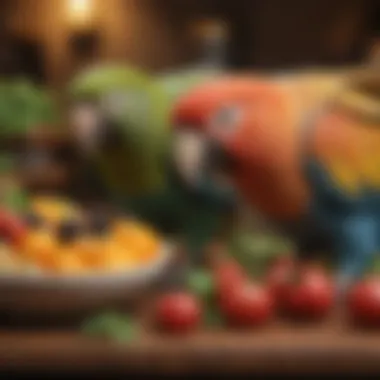
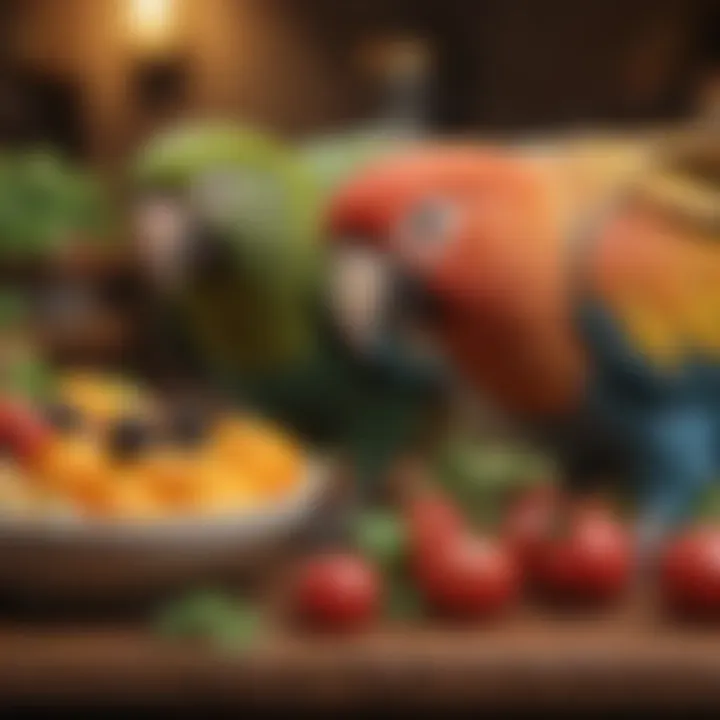
- Ensure the protein content matches the species.
- Fat might be higher in products intended for breeding or molting birds.
- Check moisture levels, particularly for pellets to avoid spoiling.
"Understanding federal guidelines helps contextualize the quality of the claiming brands regarding pet bird nourishment."
By carefully evaluating these elements on bird food labels, pet owners can choose options that align with the specific needs of their feathered friends. Ultimately, ensuring proper nutrition can contribute to a happier and healthier pet bird.
Species-Specific Dietary Requirements
Understanding species-specific dietary requirements is essential for ensuring the health and well-being of pet birds. Birds have distinct nutritional needs based on their species, size, and natural feeding behaviors. Offering a one-size-fits-all approach can lead to nutritional deficiencies or excesses, impacting the overall health of our avian companions. Tailoring the diet according to these specific needs not only improves health but also enhances vitality, mood, and even longevity.
Dietary Needs of Parrots
Parrots are often social, intelligent, and playful birds, requiring a diet that supports their active lifestyles. A typical diet for parrots should comprise a mix of fresh vegetables, high-quality pellets, and limited seeds. Fresh leafy greens, carrots, and bell peppers should form significant parts of their daily intake. Parrots also benefit from fruits such as apples and berries while citrus fruits can provide crucial vitamin C.
Special attention should be paid to their protein intake. Sources include cooked legumes, nuts, and specialized parrot foods enriched with essential amino acids. It is critical to avoid avocado, chocolate, and caffeine, as these are toxic to parrots.
Feeding Canaries and Finches
Canaries and finches typically require different approaches compared to bigger birds like parrots. Their diet mainly should consist of high-quality seeds and pellets formulated especially for small birds. Grains can be included to supply the necessary carbohydrates, while dark leafy greens serve as a vital source of vitamins and minerals.
Additionally, small fruits can offer dietary variety. These birds may benefit from light amounts of cuttlebone or mineral blocks to ensure they get adequate calcium. It is crucial to not overfeed, as many finches and canaries are prone to obesity, leading to health complications.
Nutrition for Cockatiels
Cockatiels benefit from a balanced diet which contains seeds, pellets, fruits, and vegetables. Seed mixes designed for cockatiels often include a variety of grains but should be combined with pellets for complete nutrition. Fresh vegetables such as cucumbers, spinach, and sweet potatoes provide added moisture and nutrients to their diets.
It is essential to provide proper calcium levels to prevent egg-laying issues in females. Resources like cuttlebone and calcium supplements may be useful. Cockatiels also enjoy treats, though these should be limited to ensure they don't develop health issues related to high-fat foods, similar to those found in pellets and seeds focused primarily on males during breeding seasons.
"When crafting a diet, keep in mind the varied needs of different species. Just like humans, birds have their unique preferences, tolerances, and necessities."
An educated approach toward each bird species ensures they receive the necessary diet that supports their health and well-being.
Top Rated Bird Food Brands
The choice of bird food brand can significantly impact your pet bird's health and overall well-being. Selecting a top-rated brand means considering many factors — from ingredient quality and nutritional balance to special dietary needs of different species. Moreover, reputable brands usually have a loyal customer base, giving new avian owners valuable insights about product safety and effectiveness.
It is essential to intentionally scrutinize various labels and reviews associated with reputable bird food brands. These considerations contribute to a compelling buying decision. Because a well-nourished bird tends to be happier and healthier, identifying trusted brands provides a foundation for your pet’s diet.
Brand Overviews and Product Lines
Many brands have established their presence in the avian food market, each offering unique product lines. Among the top brands to consider are Harrison's Bird Foods, Kaytee, and ZuPreem.
- Harrison's Bird Foods focuses on organic and nutritious products that cater both to pet and breeding birds. The primary consideration is maintaining strict quality and ecological standards. Their high-quality pellets are recognized for being commercially available and being suitable for long-term feeding.
- Kaytee offers a wide variety of seed mixed specifically for various species. They provide an option for both seeds and pellets, allowing owners to select what suits their birds’ tastes best.
- ZuPreem provides pellets that are especially popular among parrot owners. They present formulations tailored for specific life stages and species, enhancing the dietary regimen based on different nutritional requirements.
By understanding the different product lines available, bird owners are better able to align their pets' needs with appropriate food selections.
Customer Reviews and Feedback
Insights from other bird owners are invaluable in navigating the often-overwhelming choices around pet bird food. Reading consumer reviews highlights common concerns, praises, and personal experiences.
Some important aspects to consider from reviews include:
- Quality Control: Verified buyers frequently comment on their personal experiences with specific brands to gauge the quality. Many use language like 'the ingredients are fresh' or 'bad batch incidents'.
- Acceptance by Birds: It often can be telling when pet owners share snippets about how their birds reacted to various foods. Birds can be picky, and hearing others discuss why their birds prefer certain brands can inform selections.
- **Health Observations:**Owners provide feedback on nutritional impacts as seen in feather condition, energy levels, and general disposition after introductory use of the food.
“Choosing a good bird food is often as important as choosing quality care for a pet. Our brands created high standards support us achieving that.”
Conclusively, referencing reviews lets owners build a better understanding of different bird food options available, thus empowering and simplifying their dietary choices.
Trends in Avian Nutrition
Trends in avian nutrition play an important role in understanding the dietary needs of pet birds. Owners are becoming increasingly aware of how quality food affects their birds' health and well-being. Various developments have emerged in the market, providing better options than traditional foods. Addressing these trends helps refine feeding practices and enhances the overall care for our avian companions.
The Rise of Organic Bird Food
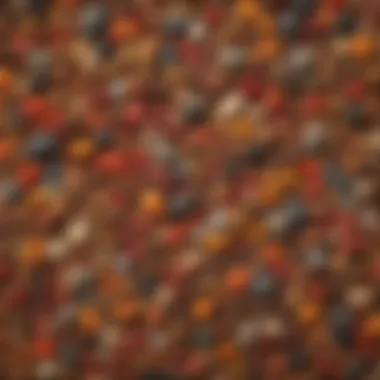
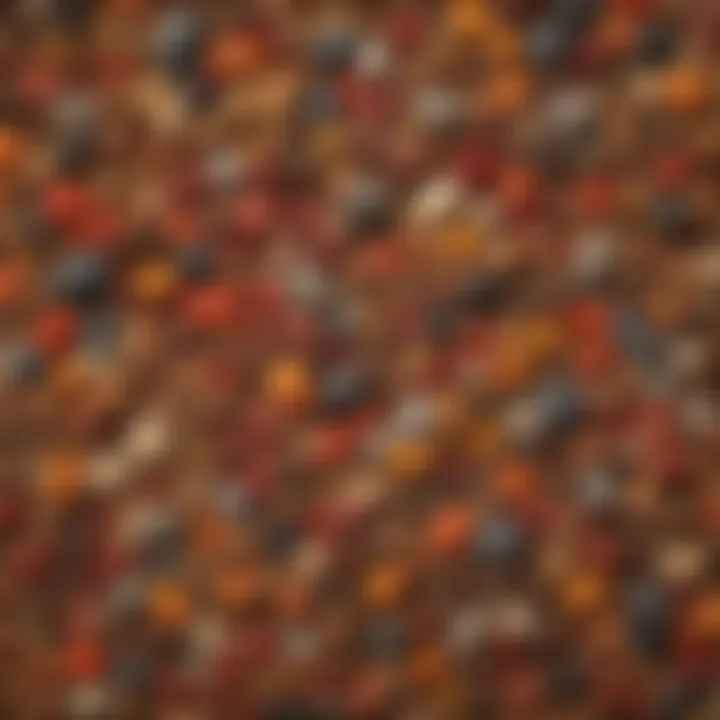
The demand for organic bird food is on the upsurge among all pet owners. Organic bird food is made from natural ingredients without synthetic additives or pesticides. This is crucial, as birds often are more sensitive to chemicals than other pets. Some notable benefits include:
- Healthier Options: Organic ingredients often provide better nutritional values. Many brands highlight the contents of their food to emphasize organic sourcing.
- Sustainability: Bird owners are becoming more conscientious about their environmental impact. Organic farming practices tend to use less harmful chemicals, thus contributing to a healthier ecosystem.
- Palatability: Many birds seem to enjoy the taste of organic food. This increased acceptance can lead to improved consumption and better overall nutrition.
While organic options are not always financially feasible for every owner, they do offer substantial health benefits, making them a worthy consideration.
Functional Ingredients: Health Benefits
Beyond the choice of organic, another notable trend is the inclusion of functional ingredients in bird food. These materials serve specific health functions that can enhance birds’ diets. Common functional ingredients include:
- Probiotics: Promoting a healthy digestive system and preventing gastrointestinal issues. These are particularly useful in dealing with the variety of microbial challenges birds face.
- Omega Fatty Acids: Supporting skin and feather health and aiding in reducing inflammation among birds.
- Antioxidants: Fighting free radicals in over the bird’s body can improve immune responses, ultimately leading to a more robust bird.
Many interviews with bird owners showcased an interest in these specialized formulations, presenting a growing market for such ingredients. Focusing on functional ingredients can enhance not just average physical health but also mental well-besing, making them invaluable in avian nutrition.
To maintain a healthy diet, it’s essential to choose bird food that includes a variety of wholesome components and caters to their unique nutritional needs.
As trends evolve, attentive owners should closely review the changing landscape of pet bird nutrition. Staying informed means making responsible decisions that align with health criteria while offering birds a satisfying food experience.
Transitioning to New Bird Foods
Transitioning to new bird foods is a process that requires careful consideration from pet bird owners. When introducing a new diet, the goal is to ensure optimal health and continued well-being of the bird. Parrots, canaries, finches, and cockatiels develop preferences that can be challenging to change, making gradual transition necessary. Additionally, the nutritional needs of birds can differ significantly depending on their species, age, and health status, so any new food must align with these factors.
It is crucial to understand that abrupt changes can lead to digestive issues such as diarrhea or refusal to eat. Other factors include assessing the new food's ingredients and preparing both the old and new diets together before the full switch. The manner in which food is presented can significantly affect acceptance by the bird. Making the process smoother assures that birds receive necessary nutrients without excessive stress.
Steps for Introducing New Diets
- Check the Ingredients: Before introducing any food, review its ingredient list. Ensure the new food provides nutritional balance while being suitable for your bird's needs.
- Gradual Introduction: Begin by mixing a small amount of the new diet into the current food. Maintain a ratio that allows the bird to get accustomed to gradual changes. Tweaking this ratio can help find a receptive balance.
- Observe Preferences: Note which foods the bird eats first. Some are naturally more inclined to certain tastes. Use that knowledge to guide future dietary choices.
- Limit Treats: When transitioning, decrease other treats during this time to ensure the new diet is fully assessed.
- Routine Feeding: Maintain a consistent feeding schedule. Birds trust patterns and familiar routines may make them more open to changes.
By taking these steps, owners can facilitate a smoother adaptation, making birds more open to trying new foods in the long run.
Monitoring Acceptance and Health
Monitoring your bird’s response during the transition is key to ensuring that the new food is a suitable addition. Here are some essential actions to take:
- Watch Eating Habits: Observe if your bird is consistently consuming both the old and new foods. Eating habits indicate acceptance.
- Check Waste: Regularly check for changes in the bird’s droppings. Healthy droppings signify proper digestion, while unusual waste patterns may suggest distress or dietary intolerance.
- Behavior Assessment: Changes in energy levels, activity, and temperament are crucial markers. Sudden changes might signal stress from the dietary transition.
“A gradual, monitored change in food can help avoid health issues and lead to a satisfactory diet that supports your bird's life.”
- Vet Consultations: For concerns or drastic behavioral changes, contacting a veterinarian is advisable. They can offer insights specific to your bird's health needs.
By closely monitoring these factors, bird owners can ensure a positive transition and promote long-term health and happiness in their avian companions.
Common Questionss About Pet Bird Food
Understanding the concerns and curiosities bird owners may have is vital in providing the best practices for their pets' well-being. Frequently Asked Questions (FAQs) extend a valuable opportunity to address common doubts and offer knowledge in the realm of avian nutrition. Addressing these concerns directly assists bird owners to comprehend what implications their feeding choices can have on the overall health and happiness of their companions. It is paramount to clear doubts surrounding bird feeding. Many stories and hearsay circulate regarding how to best nourish birds. This section will focus on answering common questions with factual insights, establishing a solid foundation for decision making surrounding pet bird diets.
Common Concerns and Misconceptions
Despite increasing awareness of pet bird nutrition, many people still hold onto misconceptions. For instance, many believe that seeds are the best option because it's what birds eat in the wild. While seeds can be part of a diet, they lack essential nutrients in principally large quantities. Offering just seeds can cause long-term health problems. Another prevalent myth is that table scraps are suitable food for birds. Most human food can be harmful. Foods such as chocolate, avocado, and caffeine are toxic for birds.
- Follow best practices when introducing new food. Pay specific attention to your bird's reaction within the first few days.
- Understand the requirements of specific breeds. Some birds like African Greys may need added calcium, whereas parrots may benefit from higher fat content.
Ruling out these myths not only emphasizes the need for a balanced diet but also encourages a thoughtful approach in selecting food that nurtures birds instead of creating hazards.
Where to Purchase Quality Bird Food
Acquiring quality bird food is a critical step in ensuring your pet’s health. There are a few places where bird owners can find what they need.
- Local Pet Stores: Visiting nearby pet shops can provide direct access to various avian foods, and staff can often suggest high-quality options tailored to different bird types.
- Online Retailers: Websites like Chewy and Amazon usually carry a broad range of products. Reviewing details and comparisons is easier online.
- Specialty Bird Boutiques: These often take pride in providing only high-quality foods specific to different species.
- Farmers' Markets: Purchasing organic produce directly can often be both fresh and healthful, perfect for supplementing your birds’ fresh food intake.
Finale
The conclusion reiterates the vital role that avian nutrition plays in the well-being of pet birds. Every diet choice impacts a bird's health, longevity, and overall quality of life. This article provides a framework for understanding the options available in pet bird food, making it easier for owners to evaluate what fits their specific needs.
An educated owner is crucial in navigating the complexities of pet bird feeding. Being aware of the differences between products, ingredients, and their nutritional implications allows for informed choices. Every bird species has unique dietary requirements. Recognizing these needs ensures that the selected food contributes positively to their health.
For avian enthusiasts, including hobbyist owners and breeders, the following aspects should be considered:
- Ingredient Awareness: Knowledge of what is in pet bird food goes a long way in promoting better health. Ingredients often play a more significant role than one might think on first glance.
- Product Evaluation: Client reviews and product lines enhance the capacity to gauge which bird food is worthwhile. Potential buyers should always reflect consumer feedback and expert advice.
- Trends in Nutrition: Staying current with trends such as organic options or functional foods can enrich an owner's understanding about advancements in bird care.
- Healthy Transitioning: Knowledge about introducing new foods correctly is essential to prevent health issues stemming from sudden diet changes. Monitoring birds during this period remains important to ensure acceptance and health stability.
In summary, the various components knitted throughout the article emphasize the importance of providing a well-rounded and nutritious diet for pet birds. Given their immense dependence on humans for their healthful living, understanding these facets of bird nutrition maximizes the life and liveliness of our avian companions. Keeping their food supply not only varied but also tailored to each bird type is crucial . Understanding their unique dietary needs shall reward owner and pet alike.















